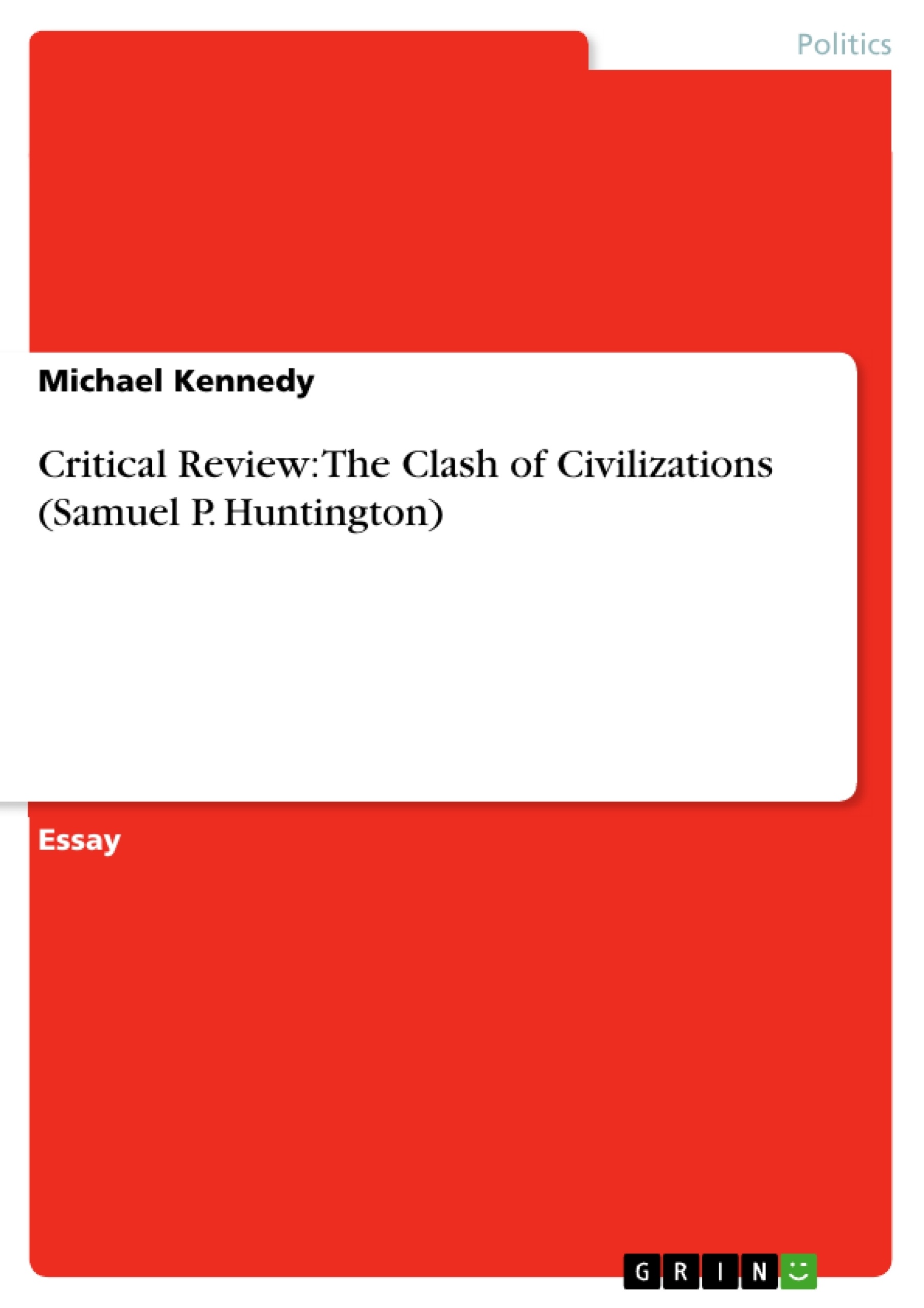This critical review examines Samuel P. Huntington’s 1993 article titled “The Clash of Civilizations?”. In this article, Huntington (1993a) argues that in the wake of the fall of the Berlin Wall, international relations would no longer be dominated by an ideological conflict as was witnessed during the Cold War years, between capitalism and communism. Nor would the next pattern of conflict be dominated by state-to-state tensions. Instead, as Huntington argues, the world would witness a clash of civilizations between a Western civilization and other major civilizations – in particular an Islamic civilization and a Confusion civilization. Huntington makes valid arguments in terms of what international relations would not be dominated by, however; the argument that a clash of civilizations based on cultural differences between the West and other civilizations is a simplistic hypothesis born out of a realist Cold War paradigm.
Table of Contents
- Critical Analysis: The Clash of Civilizations?
- Introduction
- Huntington's Argument
- Critiques of Huntington's Theory
- Globalization and Cultural Clash
- Confucian Civilization and Western Democracy
- Islamic Civilization and Western Democracy
Objectives and Key Themes
This critical review examines Samuel P. Huntington's 1993 article, "The Clash of Civilizations?". The author analyzes Huntington's argument that cultural differences will lead to conflict between civilizations in the post-Cold War era. The review evaluates the validity of Huntington's thesis and explores various critiques of his claims.
- The Clash of Civilizations Thesis
- Cultural Differences and Conflict
- Globalization and Identity
- Confucian and Islamic Civilizations' Interactions with Western Democracy
- Criticisms of Huntington's Realist Paradigm
Chapter Summaries
The review begins by outlining Huntington's central argument, where he posits that cultural divisions, particularly between the West and other major civilizations like Islamic and Confucian civilizations, will lead to future conflicts. The review then presents various critiques of Huntington's theory, arguing that his categorization of civilizations is oversimplified and that internal cultural divisions within each civilization are often more significant. It also argues that Huntington's claim that civilizations, rather than national or ethnic identities, are the primary source of conflict is questionable. Additionally, statistical analyses of conflict data challenge Huntington's claim that civilizations define the fault lines of international conflict.
The review then analyzes how globalization plays a role in Huntington's thesis, highlighting the potential for intensified cultural awareness and conflict as a result of globalization's impact on state identity and cultural traditions. Specifically, it explores the potential for a clash between Confucian states and Western democracy, and between Islamic states and Western democracy, due to perceived cultural incompatibilities.
Keywords
The key themes and concepts explored in this critical review include: Huntington's Clash of Civilizations thesis, cultural differences, conflict, globalization, identity, Confucianism, Islamic civilization, Western democracy, and realist paradigm.
Frequently Asked Questions
What is Samuel P. Huntington's main argument in "The Clash of Civilizations"?
Huntington argues that after the Cold War, international conflicts will no longer be primarily ideological or state-based, but will occur between different civilizations based on cultural differences.
Which civilizations does Huntington identify as major future rivals?
He focuses particularly on the potential clash between Western civilization and Islamic as well as Confucian (Sinic) civilizations.
What are the main critiques of Huntington's theory?
Critics argue that his categorization is oversimplified, ignores internal cultural divisions within civilizations, and relies on an outdated realist Cold War paradigm.
Does statistical evidence support the "fault lines" of civilizations?
The review mentions that statistical analyses of conflict data often challenge Huntington's claim that civilizations, rather than ethnic or national identities, define the source of conflict.
How does globalization affect Huntington's thesis?
Globalization can intensify cultural awareness and lead to conflict as it challenges state identity and traditional cultural values, potentially highlighting perceived incompatibilities between civilizations.
Why is Huntington's hypothesis considered "simplistic"?
It is considered simplistic because it assumes civilizations are monolithic blocks and fails to account for the complex internal diversity and cooperation that also exists between different cultures.
- Quote paper
- Michael Kennedy (Author), 2013, Critical Review: The Clash of Civilizations (Samuel P. Huntington), Munich, GRIN Verlag, https://www.grin.com/document/268261



